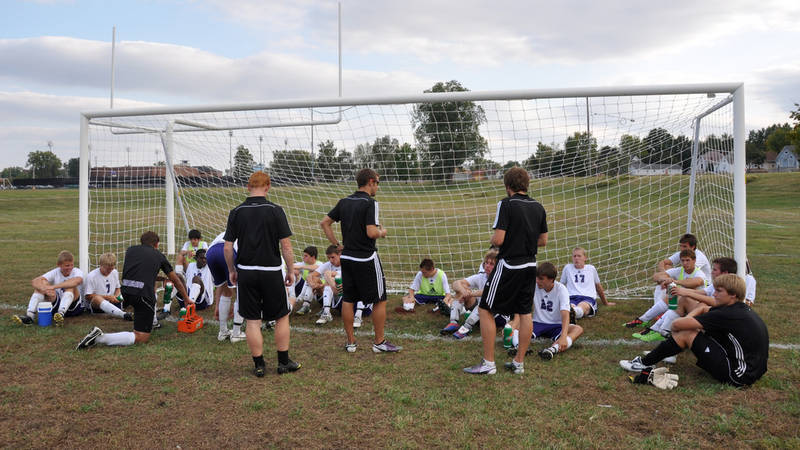Choosing a name for your 11-a-side football team is often the first step in establishing your squad's identity. A creative or memorable team name can build camaraderie among players and make your team instantly recognisable on the league table. The best football team names typically reflect either the personality of the team, a clever play on words, or a nod to professional clubs that players admire.
While 5-a-side competitions often feature more humorous names like "It's Spraining Men" or "Class on Grass," 11v11 teams frequently opt for more traditional names with local references or inspiring qualities. Names that incorporate your location, a local landmark, or your team's playing style can create an immediate connection with both players and supporters.
The tradition of naming amateur football teams in the UK differs considerably from what you might find in American soccer leagues, with British teams often showing more subtlety or wit in their choices. Whether you're starting a new team or rebranding an existing one, taking time to brainstorm a name that resonates with all squad members ensures everyone feels part of something special from the very beginning.
History of Team Names in Soccer
Football club names have developed through a rich blend of geographical, historical and cultural influences that continue to shape the identity of teams today. The naming patterns seen in modern 11v11 football emerged from humble community beginnings and evolved with the sport itself.
Cultural Significance of Team Names
Team names in British football often reveal much about a club's origins and community roots. Most clubs adopted their town or city name as the foundation of their identity, creating an immediate geographical connection. The suffixes that follow these place names frequently tell a deeper story. "United" typically indicated the merger of multiple local teams, while "City" distinguished urban clubs from their suburban counterparts.
"Rovers" and "Wanderers" harken back to the nomadic nature of early teams without permanent grounds. "Athletic" suggested sporting prowess, while "Villa" often denoted connections to a specific neighbourhood or estate. These naming conventions became powerful symbols of local pride.
Teams like Arsenal were named after their founders' workplace (Royal Arsenal), creating immediate community identification.
Evolution of Naming Conventions
The earliest organised football clubs in the 1860s and 1870s often used simple geographical identifiers with descriptive suffixes. As football expanded throughout the late Victorian era, naming patterns became more standardised yet diverse in their meaning.
By the early 20th century, most established clubs had settled on their permanent names. New teams formed during this period typically followed existing naming conventions rather than creating novel formats.
Regional variations emerged across Britain. Scottish clubs like Celtic and Rangers incorporated cultural and religious identities, while many Welsh teams included terms like "Athletic" or "Town." In modern times, newer clubs at grassroots level often blend traditional naming approaches with contemporary elements.
Corporate influence has affected some club names in recent decades, though this remains more common in other countries than in Britain, where traditional naming conventions continue to dominate the football landscape.
Creating a Football Team Name
Selecting the perfect name for your 11-a-side football team requires thoughtful consideration. The right name can inspire players, intimidate opponents and create a lasting identity for your squad.
Importance of a Strong Name
A compelling team name builds camaraderie and creates a shared identity among players. Strong names become part of the team's legacy and can influence how others perceive your squad on the pitch.
When opposing teams see your name on the fixture list, it creates an immediate impression. Names like "Phoenix United" or "Tsunami FC" convey power and resilience, potentially giving you a psychological edge before kickoff.
Your team name will appear on kits, social media and local league tables, becoming your brand in the football community. A memorable name helps attract new players when vacancies arise and can even appeal to potential local sponsors.
Brainstorming Techniques
Start by gathering your core team members for a brainstorming session. Prioritise inclusive input, as players are more likely to embrace a name they helped create.
Consider your team's unique characteristics or the area you represent. Local landmarks, historical references or regional industries can provide distinctive naming options that connect your 11v11 side to your community.
Create a shortlist of potential names and test them aloud. A good name should be easy to pronounce, lend itself to chants, and sound natural when announced at matches.
Try word association exercises. Write down football-related terms and see what connections emerge. Words like "United," "Athletic," or "Rovers" can be paired with locations or qualities to create traditional-sounding names.
Incorporating Football Terminology
Traditional football naming conventions often combine a location with a term like "City," "Town," or "Athletic." This approach gives your team legitimacy and a professional feel.
Consider incorporating footballing traditions in your name. Terms like "Albion" (ancient name for Britain), "Wanderers" (originally referring to teams without a fixed ground), or "Rovers" carry rich historical significance in British football.
Animal mascots provide strong imagery – "Lions," "Falcons," or "Bulls" suggest speed, strength and determination. Alternatively, incorporate weather elements like "Thunder," "Storm," or "Lightning" to evoke power and unpredictability.
Avoid names that might seem clever initially but could become tiresome. While humorous soccer puns might work for five-a-side casual teams, more straightforward, dignified options typically suit 11-a-side competitive squads better.
The Impact of Team Names on Branding
Team names serve as powerful identity markers that significantly influence a club's brand recognition and commercial success. The right name can create strong emotional connections with supporters while opening various revenue streams.
Merchandising Opportunities
Strong team names create substantial merchandising opportunities for football clubs at all levels. Names that resonate with local identity or convey powerful imagery are more likely to sell on shirts, scarves and other memorabilia. Research indicates that clubs experience revenue fluctuations following name changes, with attendance potentially decreasing when moving away from locally-connected names.
Team branding extends beyond the name itself to encompass logos and visual identity. These elements work together to embody club values and create recognisable symbols that supporters proudly display. Many 11v11 clubs have found success with names that reference local heritage or industry.
Merchandise sales may account for a significant portion of smaller clubs' income, making thoughtful name selection crucial for financial sustainability.
Fan Engagement Strategies
Effective team names facilitate deeper fan engagement by creating community identity. Names that reflect local culture or history help supporters feel connected to the club's heritage, fostering loyalty even through difficult times.
Clubs can leverage their names through themed match days, special events, and social media campaigns. For instance, teams with animal names might host wildlife conservation activities, while those named after historical figures could organise educational initiatives.
In grassroots soccer, names that involve supporters in selection or evolution can strengthen community bonds. Some clubs periodically refresh their branding while maintaining name recognition.
Fan chants and traditions often incorporate team names, creating memorable match day experiences. These rituals may develop organically over time, enhancing the match atmosphere and making games more enjoyable for spectators and players alike.
Popular Football Team Names in Fantasy Sports
Fantasy football gives managers the creative freedom to craft unique team identities. While millions participate in fantasy leagues worldwide, the team names often reflect football culture, player puns, and inside jokes.
Creative and Witty Team Names
Fantasy managers love incorporating wordplay into their team names. Names like "Sons of Pitches" and "Liquorice Allsports" demonstrate the humorous side of 11v11 competitions. "Kiss My Pass" and "Here for Beer" showcase the casual nature of many fantasy leagues.
Other popular choices include "Game Set and Snatch" and "Club Foot," which have become staples in fantasy communities. UK managers often lean toward football-specific humour with options like "Murder On Zidane's Floor" and "It Just Got Messi."
For those seeking simplicity, cultural references work well. Teams named "L7 Weenies" or "Ginger Ninjas" stand out without requiring extensive football knowledge.
Influence of Professional Athletes
Professional footballers frequently inspire fantasy team names. Mo Salah's popularity has led to creative options like "Chicken Tikka Mo Salah," which blends cultural references with player names.
Yahoo fantasy leagues reveal that names referencing current stars generate significant appeal. Players like James Maddison and Manuel Neuer often appear in team name puns due to their recognisable names and accomplishments.
Some managers prefer subtler references to football legends or current talents. Rather than direct name usage, they might incorporate team affiliations, playing styles, or notable achievements.
Fantasy managers sometimes update their team names throughout a season to reflect standout performances, transfers, or memorable incidents in actual matches.












